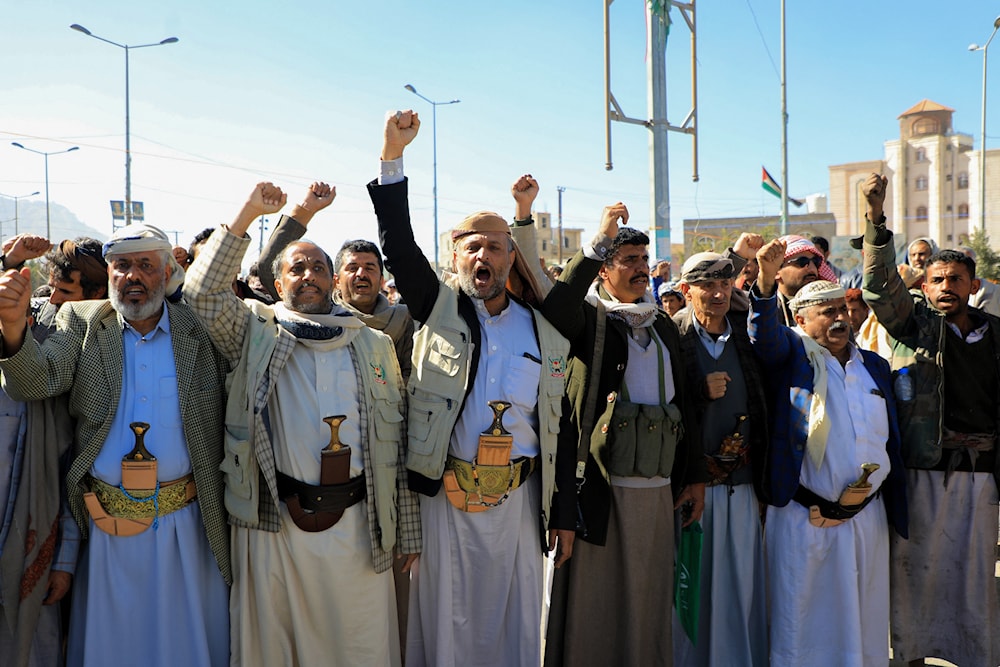Attacks on Yemen will not deter Sanaa: Western media
Western media touch on the recent US-UK aggression on Yemen and suggest that these attacks will further escalate tensions in the Middle East.
-

Yemeni men take part in a march in solidarity with the Palestinian people in Sanaa on January 11, 2024. (Photo by MOHAMMED HUWAIS / AFP)
Shortly after the United States and the United Kingdom carried out aerial aggression on multiple locations in Yemen, The Wall Street Journal mentioned that US officials anticipated that the Yemeni forces "may continue striking ships shortly after the U.S. strikes to signal they wouldn’t be deterred and continued to pose a threat to ships sailing in the Red Sea."
The New York Times cited US officials as saying that "there was a fear that strikes on Yemen could escalate into a tit-for-tat between American naval vessels" and the Yemeni forces. The newspaper also revealed that some US allies in the Middle East, including Qatar and Oman, had raised concerns that strikes "could spiral out of control and drag the region into a wider war."
On its part, The Washington Post considered that "Thursday’s strikes will almost certainly heighten tensions across the Middle East." The Post said that "some analysts were doubtful the operation would have the intended effect of curbing the Red Sea attacks."
The newspaper quoted Michael Knights, a scholar at the Washington Institute for Near East Policy, as saying that the Yemenis "win by taking a U.S. strike, no matter how heavy, and showing that they can keep going with the shipping attacks."
According to Knights, the Yemenis "are high on their successes and will not be easy to deter. They are having the time of their lives, standing up to a superpower who probably cannot deter them."
In the same context, Bloomberg considered that deterring Sanaa is not an easy matter, adding that the latter has succeeded in withstanding the military campaign led by Saudi Arabia against it and remains firmly entrenched.
The news agency warned that with the possibility of more similar strikes against Yemen, the Red Sea will be a less attractive route for shipping companies.
The Telegraph also suggested that instead of deterring the Yemeni forces, these Western strikes may encourage them to take further actions, including attacks on the Israeli settlement of "Eilat".
In the same context, BBC pointed out that Sanaa is "skillful in dealing with attempts to weaken it by a larger force" after years of war and Saudi attacks on its military infrastructure, adding that it is not clear that the strikes will deter Sanaa and recalled that the Yemenis have already warned that any US attack will prompt a heavy response from them in the Red Sea.
NBC also reported that "Israel" received a warning from the United States about the possibility of an imminent attack from Yemen, urging it to be "on alert for a possible response from Sanaa to the airstrikes against it.
US, UK to bear severe consequences for blatant aggression: Sanaa
Shortly after the strikes, Hussein al-Azzi, the Deputy Foreign Minister in the Sanaa government, warned that the United States and Britain must be "prepared to pay a high price and bear the severe consequences for their blatant aggression."
On his part, Mohammad al-Bukhaiti, a member of the Ansar Allah political bureau, emphasized that the US and the UK "will soon realize that the direct aggression on Yemen was the biggest folly in their history."
Fadl Abu Taleb, another member of Ansar Allah's political bureau, reiterated Sanaa's assertion that the US-British aggression "will not remain unanswered," warning that the countries of aggression "will bear the consequences and repercussions of it."
Abu Taleb indicated that the latest aggression came "against the backdrop of Yemen's supportive stance for the Palestinian people in the face of Israeli aggression."
He stressed that the US-British aggression will not achieve any results and will not deter the Yemeni people from continuing their support for the Palestinian people.
Earlier, the leader of the Yemeni Ansar Allah movement, Sayyed Abdul-Malik al-Houthi, warned that any American aggression on Yemen will not go unanswered, affirming that Sanaa is ready for any direct confrontation with Washington.

 4 Min Read
4 Min Read









